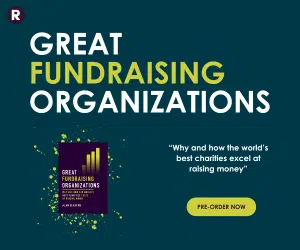Why can't we recruit the best fundraisers?
Given the number of redundancies being made across both not for profit and commercial sectors, I am still pleasantly surprised to see a good number of fundraising and commutations roles being advertised in the trade press each week.
On paper, there seems to still be a demand for these skills (albeit lower than in previous years) and plentiful supply. So why is it so difficult for charities to fill such roles with the best quality candidates? I’m no recruitment or HR specialist but I have employed many people during my career (and worked in the HR industry for a few years) and it seems to me that something isn’t working right.
Through contacts in various recruitment agencies I know of several roles which are now on their fourth or fifth round of assessment and interview. Are none of these charities adding up the costs of management time spent on unsuccessful recruitment rounds? Are all the candidates really not good enough? Of course not.
Advertisement
No charity starts the recruitment process thinking they won’t find anyone or that their expectations or processes are flawed. But, some processes are flawed and, if you add this to potentially unrealistic expectations of candidates, it’s unsurprising that the same roles appear to be revolving through the job adverts month after month.
With this in mind, here are a few thoughts on what charities should do based on mine and several colleagues’ experiences. It’s not intended to be a guide to recruitment but merely to highlight a few stumbling blocks to attracting the best candidates.
Sell yourself. The recruitment process requires you to turn your role into a proposition for candidates. As a society, we have become much more demanding in terms of what we want out of work and this means you are unlikely to have a queue of perfect candidates banging on your door, begging to do the job irrespective of circumstances. You need to view the whole recruitment process as creating and communicating a case for support for why the candidates want to work with you. Let your fantastic work do the selling for you.
Put the candidate at the heart of the process – attracting job candidates is just like attracting donors. That means targeting and integrating communications on and offline (ie; your message needs to be where the candidates are looking for it) and introducing your charity’s personality, views and thoughts on the world. Paint a picture of your working culture so they get a good idea of what it will be like if they join and don’t forget to include the outcomes you have achieved. These can be really motivating for high quality candidates.
Make your expectations realistic and relevant. For fundraising roles, it’s useful to include targets, campaign outcomes and past successes as part of your recruitment case for support. Ensure that they are relevant to the role ie; a Fundraising Exec will just be daunted by an annual target of £50 million and won’t be able to relate that to their daily work expectations. Break it down like you would a gift pyramid to make it more tangible for the candidates.
Manage your timings realistically. I know it can’t always be helped but don’t keep candidates hanging on through a lengthy process. It helps you and them to see all candidates for interviews over no longer than two to three weeks. You get the candidate recruited quicker (or can move on if unsuccessful) and the candidate has you at the front of their mind which will in turn lead to a better interview and assessment.
Use imaginative role descriptions, imagery, videos and staff contributions to bring your case for support to life for candidates. Check out these examples from =mc. I think they manage candidate expectations really well and paint a colourful picture of what life is like working at The Management Centre.
Don’t blindly follow HR process downloaded from some best practice website (or indeed any other source). There is a huge difference between the kind of material created by =mc and a dry 10 page role description, person specification and skills profile which looks like it has been produced for the sake of it. Remember the case for support test; would you ask a high value donor or corporate partner for money this way?
Minimise paperwork. Candidates will react in the same negative way if they are not attracted to both you and the role so minimise paperwork and hurdles.
Don’t interview and test candidates endlessly unless the role requires you to assess specific skills. I know of a current vacancy for a £16,000 Trusts assistant where candidates are interviewed three times and asked to prepare a presentation. Too much! Just think of the wasted time.
Don’t use the recruitment process to generate ideas for yourself. Candidates should not be expected to come up with your fundraising plans for the next three years as part of the recruitment process. If you want their input at this level, hire them. This is surprisingly common practice and is generally resented by candidates to the point where many are actually copyrighting their work during the recruitment process.
Use sector salary surveys and benchmarks to ensure that you can at least be competitive when it comes to money. Don’t say the package is competitive if it sits right at the bottom of the range for the role. This only disappoints candidates when they find out the truth and makes them less inclined to work with you. If you can’t afford a higher salary, use other means to attract good quality candidates by positioning the role as a development or learning opportunity which will help you. This might sound trite but a candidate who is fully aware of the financial benefits from the outset and still wants to continue the process is much more likely to stay.
Be prepared to compromise. Like buying a house or negotiating a contract, yo are unlikely to always get 100% perfect outcomes. Work out in advance what areas are vital and what an acceptable level of skills or experience looks like. I’m not suggesting you recruit sub-standard candidates but ensure a reality check is in place within your process.
I’m certain this is not an exhaustive list so any thoughts would be more than welcome.
I’ll post another blog in a few days with ideas for candidates looking for fundraising and communications roles.





